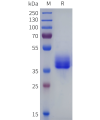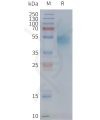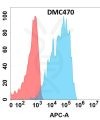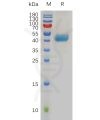CXCR1/CD181 recombinant proteins and antibodies
C-X-C chemokine receptor 1 (CXCR1), also known as CD181, CMKAR1 or IL8RA, is a G protein-coupled receptor (GPCR) belonging to the C-X-C chemokine receptor family, primarily expressed on immune cells such as neutrophils, macrophages, and certain tumor cells. CXCR1 plays a crucial role in immune cell chemotaxis by binding to its ligand IL-8 (also known as CXCL8), thereby participating in inflammatory responses, immune regulation, and tumor metastasis. CXCR1 is implicated in the development of various inflammatory diseases, infectious diseases, and cancers. Studies have shown that activation of CXCR1 can enhance inflammatory responses in immune cells, exacerbating tissue damage, particularly in conditions like rheumatoid arthritis, inflammatory bowel disease (IBD), and chronic obstructive pulmonary disease (COPD). Furthermore, CXCR1 also contributes to tumor growth and metastasis in the tumor microenvironment, particularly through the regulation of neutrophil recruitment and tumor immune evasion.
Given the important role of CXCR1 in immune responses, drug development targeting this receptor is emerging as a key focus in cancer therapy and anti-inflammatory treatments. CXCR1 antagonists can block the interaction between IL-8 and CXCR1, reducing immune cell recruitment and thereby alleviating inflammation and potentially inhibiting tumor growth and metastasis. Currently, CXCR1 antagonists are under development, primarily for the treatment of cancer, chronic inflammation, and other immune-mediated diseases.
Several biopharmaceutical companies are actively engaged in developing CXCR1-targeted drugs. For example, AxioMx is developing CXCR1 antagonists for the treatment of various cancers, including non-small cell lung cancer (NSCLC) and other CXCR1-associated tumors. Additionally, companies like Amgen and Bristol-Myers Squibb are exploring the potential of CXCR1-targeted therapies, investigating their applications in anti-inflammatory and immunotherapy. Increasing evidence suggests that modulating the immune microenvironment through CXCR1-targeted drugs could enhance anti-tumor immune responses and improve anti-inflammatory treatment outcomes. As research into the mechanisms of CXCR1 continues to deepen, the pace of clinical trials for CXCR1-targeted drugs is accelerating, offering the promise of new therapeutic options for various types of cancer and chronic inflammatory diseases.
To assist in the development of CXCR1 targeted drugs, DIMA BIOTECH can now provide a series of spot products targeting CXCR1, including CXCR1 recombinant proteins, CXCR1 full-length membrane proteins, anti-CXCR1 monoclonal antibodies and biosimilar reference antibodies. At the same time, we can also provide systematic services, including protein/antibody customization services, antibody humanization, antibody affinity maturation, stable cell lines, etc. In addition, we have established a B cell seed bank targeting CXCR1, which can screen out the lead antibody molecules required by customers in just 20 days.
ECD Proteins
SKU: PME-M100128 Target: CXCR1 Tag: C-Human Fc tag
Price:10μg $103.00 ; 50μg $388.00 ; 100 μg $568.00
Full Length Transmembrane Proteins
SKU: FLP100091 Target: CXCR1 Tag: C-Flag Tag
Price: 10 μg $900.00 ; 50 μg $4400.00 ; 100 μg $8000.00
Monoclonal antibodies
SKU: DMC100470 Target: CXCR1
Application: Flow Cyt
Price: 10μg $99.00 ; 100 μg $446.00 ; 500 μg $1340.00
ECD Proteins
SKU: PME100820 Target: CXCR1 Tag: C-Human Fc Tag
Price: 10μg $103.00 ; 50μg $388.00 ; 100 μg $568.00
Monoclonal antibodies
PE-conjugated Anti-CXCR1 antibody(DMC470); IgG1 Chimeric mAb
SKU: DMC100470P Target: CXCR1
Application: Flow Cyt
Price: 100 test $550.00
Full Length Transmembrane Proteins
SKU: FLP120091 Target: CXCR1 Tag: C-Flag&Strep Tag
Price: 10 μg $810.00 ; 50 μg $3960.00 ; 100 μg $7200.00
Monoclonal antibodies
SKU: DMC100470B Target: CXCR1
Application: Flow Cyt
Price: 10μg $139.00 ; 100 μg $670.00 ; 500 μg $1999.00





